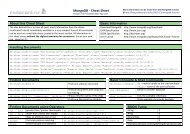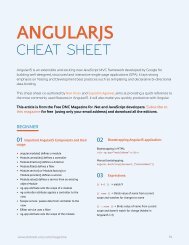build_your_own_angularjs_sample
build_your_own_angularjs_sample
build_your_own_angularjs_sample
You also want an ePaper? Increase the reach of your titles
YUMPU automatically turns print PDFs into web optimized ePapers that Google loves.
Build Your Own Angular Chapter 1. Scopes And Digest<br />
In the test case we invoke $watch to register a watcher on the scope. We’re not interested<br />
in the watch function just yet, so we just provide one that returns a constant value. As<br />
the listener function, we provide a Jasmine Spy. We then call $digest and check that the<br />
listener was indeed called.<br />
A spy is Jasmine terminology for a kind of mock function. It makes it convenient<br />
for us to answer questions like "Was this function called" and "What arguments<br />
was it called with"<br />
There are a few things we need to do to make this test case pass. First of all, the Scope<br />
needs to have some place to store all the watchers that have been registered. Let’s add an<br />
array for them in the Scope constructor:<br />
src/scope.js<br />
function Scope() {<br />
this.$$watchers = [];<br />
}<br />
The double-dollar prefix $$ signifies that this variable should be considered private<br />
to the Angular framework, and should not be called from application code.<br />
Now we can define the $watch function. It’ll take the two functions as arguments, and<br />
store them in the $$watchers array. We want every Scope object to have this function, so<br />
let’s add it to the prototype of Scope:<br />
src/scope.js<br />
Scope.prototype.$watch = function(watchFn, listenerFn) {<br />
var watcher = {<br />
watchFn: watchFn,<br />
listenerFn: listenerFn<br />
};<br />
this.$$watchers.push(watcher);<br />
};<br />
Finally there is the $digest function. For now, let’s define a very simple version of it,<br />
which just iterates over all registered watchers and calls their listener functions:<br />
src/scope.js<br />
Scope.prototype.$digest = function() {<br />
_.forEach(this.$$watchers, function(watcher) {<br />
watcher.listenerFn();<br />
});<br />
};<br />
The test pass but this version of $digest isn’t very useful yet. What we really want is to<br />
check if the values specified by the watch functions have actually changed, and only then<br />
call the respective listener functions. This is called dirty-checking.<br />
8 ©2014 Tero Parviainen Errata / Submit




